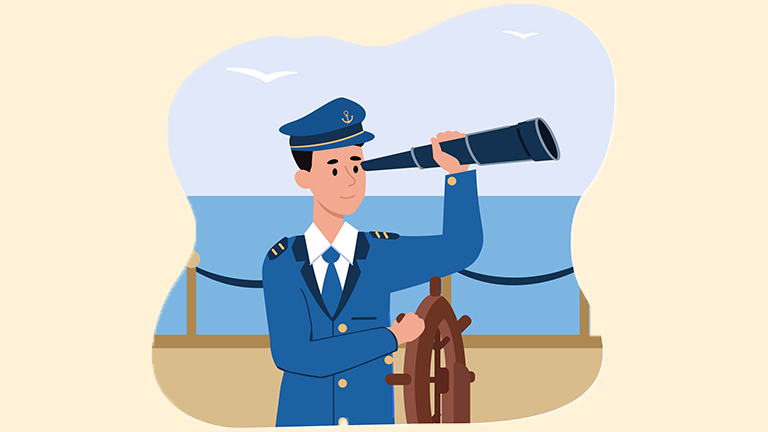
Seafaring is about managing constant changes. For those at sea, there is adaption to new technology, new skills, and an array of regulations to manage. While seafarers deal well with such change, there is one that is threatening the very nature of what it is to go to sea, and that is the breaking apart of the shipboard social dynamic.
The Hidden Cost of Isolation
Seafarers have to deal with many challenges. One of the most difficult is that if isolation and loneliness. Spending extended periods away, with limited opportunities for social interaction has implications for mental health and wellbeing.
While there can be moments of enjoyment for seafarers, the potential for mental health issues is never far from the surface. The absence of a strong support network can exacerbate feelings of isolation, making seafarers particularly vulnerable to depression, anxiety, and suicidal thoughts.
Working at sea can mean demanding schedules and long contract durations, all of which can exacerbate feelings of loneliness and stress. Limited shore leave further restricts seafarers & opportunities to recharge and connect with the outside world.
This unrelenting pressure can lead to burnout, fatigue and sometimes aspects of depression. Despite this, the mental health of seafarers is often overlooked.
Technological advancements have brought about some respite. Access to the internet and Wi-Fi onboard has allowed seafarers to stay connected with their families, which is crucial in reducing feelings of isolation. However, unreliable and expensive connections can still leave many feelings detached from the world they left behind.
Social Cohesion
The challenges faced by seafarers are real, and there need to be ways of fostering communication, community, and a better work-life balance. The importance of interactions onboard is therefore amplified, but unfortunately, there are evolving realities which are further damaging the social aspects of seagoing.
Imagine leaving your home, family, and everything familiar for months on end. As a seafarer, you join a ship. Standing at the bottom of a long gangway, looking up at your new world. It is your workplace, living space, and social environment, all rolled into one. So any issues onboard quickly impact all seafarers’ lives and experiences.
To combat these challenges, it is essential to foster a sense of community and open communication among crew members. Creating spaces for seafarers to connect, share experiences, and access resources can make a significant difference to their wellbeing.
Simple initiatives, such as regular social activities, team-building exercises, and mental health awareness programs, can help build a more supportive onboard environment creating opportunities to enhance wellbeing. Additionally, providing access to professional counselling services, either in person or remotely, can offer
vital support to those struggling with mental health issues.

Erosion of the Group Dynamic
Historically, social interactions onboard ships were vital for crew morale and well-being. However, modern maritime operations, automation, and ship design changes have diminished these interactions.
Increased automation has reduced crew sizes and traditional roles, leading to less camaraderie and support among the crew. High turnover rates and evolving industry practices further disrupt social cohesion. To address these issues, it is essential to foster a supportive onboard environment with regular social activities and team-
building exercises.
The group dynamic, which previously facilitated camaraderie and mutual support has eroded. Additionally, evolving industry practices and the high turnover rate contribute to a lack of continuity among crew members, further disrupting social cohesion.
To address these critical issues, it is imperative to foster a supportive and communicative environment onboard. This requires both systemic changes and targeted initiatives.
Improving communal spaces and encouraging engagement can counteract the isolation of seafaring life, making it more appealing for seafarers to connect rather than retreat to their cabins.
Mental Health Resources
Enhancing mental health resources for seafarers is crucial to their wellbeing. Access to professional counselling, whether onboard or via remote consultations, offers essential support for managing mental health challenges.
Mental health awareness programs are vital for reducing stigma, educating seafarers, and encouraging help-seeking behaviour. Supportive industry policies and culturally sensitive programs further enhance these efforts, though more
improvements are needed beyond the Maritime Labour Convention (MLC2006) to better support seafarers & mental well-being.
As a global major port, Hong Kong has a vital role as an industry leader. A strategic approach from ports is pivotal in advancing these initiatives. Hong Kong can lead by implementing mental health and wellbeing workshops, collaborating with shipping companies, and integrating mental health support into operational frameworks.
By fostering strategic partnerships and championing these initiatives, Hong Kong can set a precedent for maritime hubs worldwide, ensuring seafarers receive the comprehensive mental health support they need to create wellbeing.

Steven Jones
About the author
Steven Jones is a former seafarer living in the UK. He conducts research on the
wellbeing of those working at sea. He is Founder of the Seafarers Happiness
Index and works alongside the Mission to Seafarers to bring change in how the
Maritime Industry interacts with mental health and wellbeing.
Recently Added
As we step into the New Year once again, we arrive at an opportunity to reflect, reset and recreate. While self-reflection could …
The human body is like a symphony, with all parts working in harmony to sustain health. While the brain is often seen …
The concept of coaching has evolved significantly since its origins in sports during the 1880s. Today, it extends beyond physical training and …




